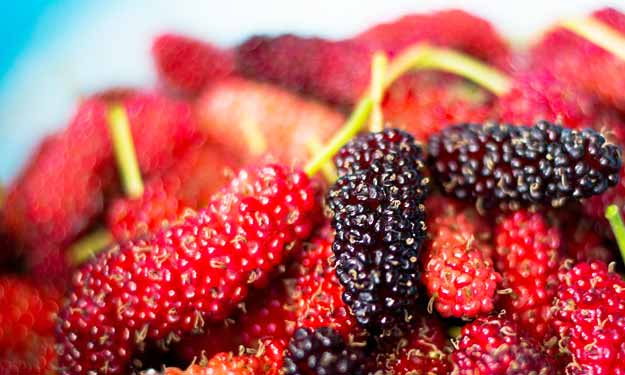Mulberries
Species Name: Morus
Also known as: White Mulberry, Black Mulberry, American Mulberry, Red Mulberry, Mulberries
Mulberry trees are native to China, Europe, Asia and some areas of the United States, ranging in size from 15' to 75' and higher. The berries, similar to raspberries (but longer and they grow in clusters), also vary in color from white and reds (these berries are typically harvested in late spring), to blacks (these berries are typically harvested in late summer).
Most of the mulberry plant (fruit, leaves, and stems) contain antioxidants such as resveratrol and are full of nutrients and vitamins like: A, C, E, K, B Vitamins, fiber, folate, iron, magnesium, niacin and potassium; the darker the berry, the higher the antioxidant properties.
Mulberries have been used for hundreds of years both medicinally and therapeutically to treat many ailments, they are a sweet berry that have just a bit of tartness and can be used in a variety of ways. They can be used in baked goods, eaten fresh or dried, used as a topping on desserts, making wine, juicing, jams and more.
Home Remedies and Mulberries
Mulberry comes in the form of fresh and dried fruit, mulberry juice, mulberry extracts and powder form.
Protect Against Free Radicals
Because of the abundant source of antioxidants, mulberries can help rid the body of free radicals and protect cells from damage.
Weight Loss
Mulberries are full of nutrients and low in calories, they make a perfect light snack if you are trying to lose weight.
Lower Cholesterol Levels
Adding mulberries to your diet can help lower bad cholesterol levels and help prevent cardiovascular issues.
Promote Digestive Health
Mulberries contain fiber which can help with stomach problems such as relieving constipation and bloating. Having good digestion can also help you maintain a healthy weight.
Mulberries can also help to:
- Promote Kidney and Liver Health
- Maintain Healthy Blood Sugar Levels
- Lower Risk of Heart Disease
Mulberry Leaf Tea
Mulberry tea is made from fresh or dried leaves of the tree. As per Ralph Kenney from Immortalitea states the leaves from the white mulberry can be mildly toxic but once cooked or dried are safe.
Using Dried Mulberry Leaves for Tea
- Pick the young leaves from the tree, rinse and lay out to dry.
- Depending on how much sun there is, it could take 3 days or longer for the leaves to dry. If you dry them indoors, place them on paper towels in a warm spot until dry.
- When dry lightly crush into small pieces (not powder) and place in empty tea bag or cheese cloth. About 2 to 3 teaspoons.
- Fill cup with boiling water and steep until desired taste.
Side Effects of Mulberries
Some people may have an allergic reaction to mulberries. The berries of the white mulberry may cause abdominal discomfort, diarrhea, bloating if eaten in excess due to the fatty acid content. Always consult your doctor if you have any questions or are taking other medications. If you think you are having a reaction, stop eating mulberries.



